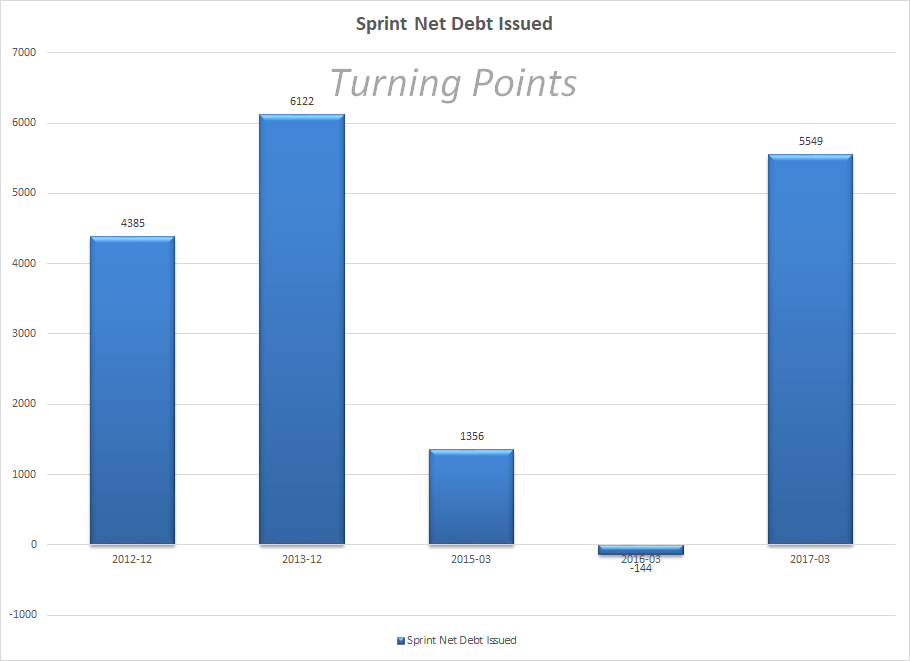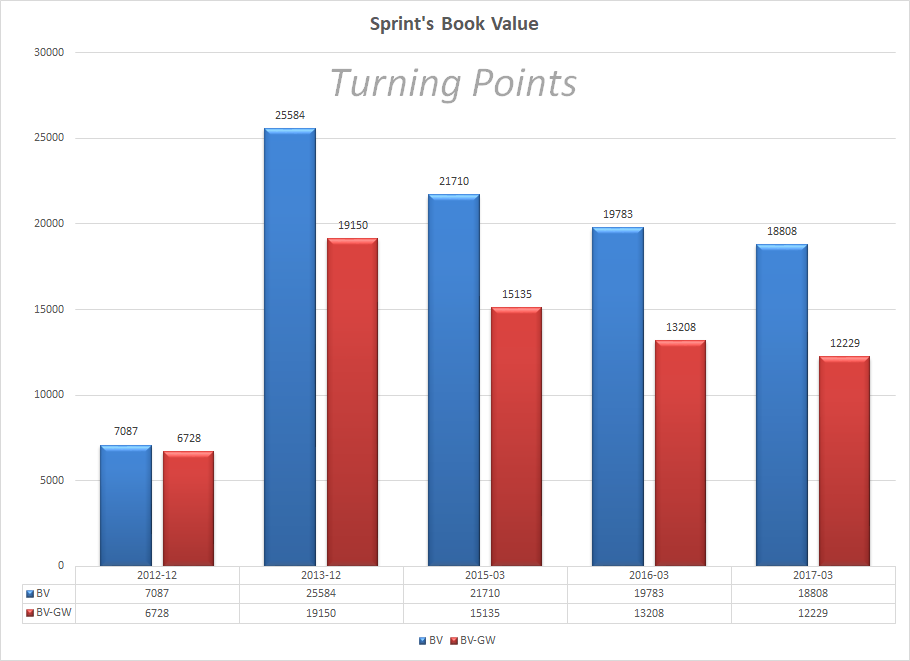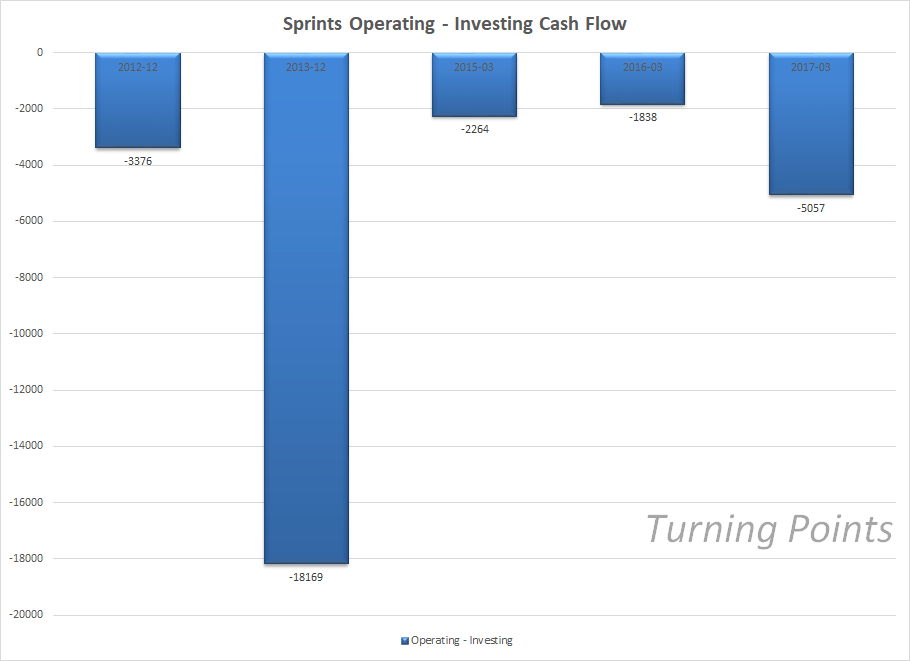Summary
The final price for this deal is slightly above Sprint's raw book value (assets-liabilities).
T-Mobile US Inc (NASDAQ:TMUS) is getting Sprint for less than Sprint's enterprise value.
But Sprint is not exactly an unvarnished gem.
This idea was discussed in more depth with members of my private investing community, Turning Points.
The big news today is that T-Mobile (TMUS) will buy Sprint Corp (NYSE:S) for $26.5 billion. From Bloomberg:
T-Mobile US Inc. and Sprint Corp. agreed to combine in a $26.5 billion merger, creating a wireless giant to compete against industry leaders AT&T Inc (NYSE:T). and Verizon Communications Inc (NYSE:VZ).
Deutsche Telekom AG (DE:DTEGn), the Bonn, Germany-based company that controls T-Mobile, and SoftBank Group Corp (OTC:SFTBY)., the Tokyo-based owner of Sprint, agreed to a combination that values each Sprint share at 0.10256 of a T-Mobile share, the companies said in a statement Sunday. That ratio values Sprint at $6.62 a share based on T-Mobile’s Friday closing price of $64.52.
As I'll show below, T-Mobile is getting a good deal. But that's because Sprint just isn't that great of a company.
What's Sprint really worth? Let's start with book value: assets - liabilities. This is the most basic valuation measurement available:
(data from Morningstar.com; author's calculations)
All I've done here is to subtract total assets from total liabilities (in blue). According to this measure, Sprint is worth $18.8 billion, which makes the $26.6 billion bid 141% higher than Sprint's 2017 book value. I've added a second calculation (above in red), where I remove goodwill from the measure. Personally, I detest goodwill. If you ask 10 different accountants what a company's goodwill is, you will get 10 answers. Using that calculation, book value at the end of 2017 was $12.2 billion, which means T-Mobile paid more than twice Sprint's book value. Regardless of which measurement you use, the total cost is at a premium. But, paying 1.5x-2x book value for one of the four major cell phone companies isn't really that pricey.
Next up, let's look at Sprint's market capitalization. According to Finviz.com, Sprint has 3.71 billion shares outstanding. At $6/share that's $22.6 billion. Again, T-Mobile is paying a premium, but not much above current market value.
Let's next look at enterprise value, where we also include total debt and cash in the calculation (for the sake of simplicity, I'm skipping the preferred and minority interest parts of the equation, just to keep this "back of the envelope" friendly). According to Sprint's latest balance sheet, they have $35 billion in debt and $8.3 billion in cash. Assuming Sprint's debt is trading at par, the company's enterprise value is $48.90 billion (22.26 + 35 - 8.3). Even if we assume that Sprint's debt is trading at 50 cents on the dollar, Sprint's enterprise value is $31.46 billion ($22.26+17.5-8.3). This is a far more complete value measurement and shows that T-Mobile is getting a pretty good deal.
But the final amount is low fora very a very important reason: Sprint has problems. I compared the four major wireless carriers a few months ago and had this to say about Sprint:
Sprint has posted a net loss for each of the last three years (top row). While not encouraging, it’s not the end of the analysis; plenty of companies have net losses yet still generate sufficient cash to fund operations. After adding and subtracting various items we find that for the last three years Sprint’s operations have been cash flow positive. But after subtracting the company’s two largest investments (network and leased devices), cash flow is once again negative. This means that financing has provided Sprint’s new cash for the last three years, which has resulted in total long-term debt increasing from 37% to 42% of total assets from 2016-2017. Interest payments as a percent of gross revenue are also increasing, totaling 5.94%, 6.78% and 7.48% in fiscal 2015, 2016, and 2017, respectively.
Here's a chart of the basic problem Sprint is facing:
(Data from Morningstar.com; author's calculation)
There are three categories of cash flow on the cash flow statement. The first is "cash from operations." This category shows how much actual cash (as in physical dollars) the company's operations generate over a twelve-month period. The second category is "cash spent on investments," which shows the company's capital outlays. If the company is very profitable, it can self-fund investment, which ultimately means it doesn't have to get third-party financing to continue as a going concern. But if a company is cash poor, it needs third-party cash on a regular basis. And that is Sprint's real problem: every year, they needed to either issue debt, issue equity, or get a loan to get cash. They chose debt:

In three of the last five years, Sprint issued an average of $5.4 billion dollars of debt. This situation is unsustainable; at some point, the debt burden becomes too high for the company.
This is the reason why Sprint would eventually be sold. And it also means that while T-Mobile gets Sprint's customer base and network assets, they're also buying some problems.
This post is not an offer to buy or sell this security. It is also not specific investment advice for a recommendation for any specific person. Please see our disclaimer for additional information.
Disclosure:I/we have no positions in any stocks mentioned, and no plans to initiate any positions within the next 72 hours.
I wrote this article myself, and it expresses my own opinions. I am not receiving compensation for it (other than from Seeking Alpha). I have no business relationship with any company whose stock is mentioned in this article.


